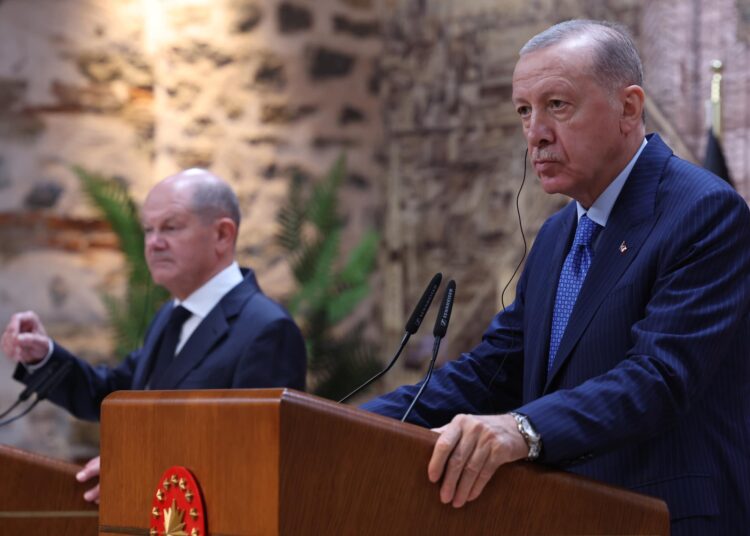Abdullah Bozkurt/Stockholm
The investigation, prosecution and trial of Turkish intelligence operatives, assets and informants in Germany have intensified in recent years, showing a clear pattern of relentless and aggressive espionage activity by Turkey inside the territory of a NATO ally, where the judiciary has been struggling to cope with a surge of cases, a review of recent legal proceedings shows.
The handling of these cases reveals a judiciary caught between enforcing the law, managing diplomatic sensitivities and confronting the limitations of statutes that often classify espionage as a minor offense.
The most recent example came on September 24, when the Higher Regional Court (Oberlandesgericht, OLG) in Düsseldorf formally closed the prosecution of Mehmet K., a 58-year-old Turkish national accused of spying for Ankara’s notorious intelligence service, Millî İstihbarat Teşkilatı (MİT).
According to prosecutors between September 2018 and August 2021, Mehmet K. secretly corresponded with Turkey’s intelligence service via the Turkish police, using anonymous letters to conceal his identity. In those communications he allegedly provided contact details and personal information of individuals in the Düren area whom he believed were linked to the Gülen movement, a group critical of the government of Turkish President Recep Tayyip Erdogan and subjected to an unprecedented crackdown through the blatant misuse of the criminal justice system by Turkey’s authoritarian regime.
The movement represents a volunteer-driven international network with a strong emphasis on education, interfaith dialogue, anti-radicalization initiatives and community empowerment. It maintains a significant presence among the Turkish diaspora. Turkish intelligence has devoted vast resources to tracking down individuals associated with the group, subjecting them to surveillance and harassment as part of Erdogan’s broader campaign of intimidation aimed at instilling fear across opposition networks both inside Turkey and abroad.
The Düsseldorf case involved Turkish national Mehmet K., who was fined €5,000 to settle espionage charges linked to Turkey’s intelligence agency, MIT:
The charges against Turkish intelligence informant Megmet K. fell under § 99 of the German Criminal Code (StGB), which criminalizes intelligence activity on behalf of a foreign power. Conviction could have led to a sentence of up to five years.
Yet the case never reached a full verdict. Because § 99 StGB classifies such espionage as a “Vergehen” (non-felony), the court was able to discontinue the proceedings under § 153a of the Code of Criminal Procedure (StPO), with the consent of both the defendant and the prosecutor. Mehmet K. was ordered to pay €5,000, and after the sum was received, the case was formally and permanently closed.
The outcome meant that one of Germany’s highest state security courts had treated the prosecution of a MIT informant as a matter resolved by a modest financial penalty, emblematic of the challenges faced by German justice in these cases.
The Düsseldorf case is far from isolated. It forms part of a broader pattern of prosecutions, investigations and settlements in Germany over the past decade involving alleged MIT activity, during which the Erdogan government has increasingly sought to export its domestic crackdown on the opposition beyond Turkey’s borders through the use of intelligence and diplomatic instruments.

The first serious alarms were raised in 2016, when German authorities began scrutinizing suspected Turkish agents operating among diaspora communities. A year later, the Federal Office for the Protection of the Constitution (BfV) publicly disclosed that Turkey had handed Berlin a list of hundreds of alleged Gülenist schools, associations and individuals, effectively highlighting Turkey’s informant network within Germany.
German authorities scrambled to protect the group from Ankara’s targeting campaign, warning its members to exercise caution as they remained under the watch of Erdogan’s government. In bilateral talks German officials repeatedly raised the issue with their Turkish counterparts, making clear that Berlin would not tolerate intensified espionage on its soil, particularly activities directed against political dissidents, journalists and activists.
One of the earliest and most significant espionage prosecutions came in 2015, when Germany’s federal attorney general charged Muhammet Taha Gergerlioğlu — a close adviser to President Erdogan and an alleged MIT operative — with conducting intelligence activities. He and two associates were accused of gathering information on Turkish nationals in Germany who were critical of Ankara. Although he spent 11 months in a German prison, Gergerlioğlu was ultimately released, a move widely interpreted as part of a political bargain between Turkey and Germany.
Gergerlioğlu is also notorious as a leading anti-Semitic figure in Turkey. He has repeatedly claimed that the world is dominated by Jewish bankers, a conspiracy theory long propagated in extremist circles, and has gone so far as to publicly accuse Germany of being a “secret Jewish Zionist state.” Today, he heads a front organization in Turkey called Ulusal Stratejiler ve Politikalar Üretme Merkezi (Center for Producing National Strategies and Policies), which frequently disseminates anti-Western propaganda in line with Ankara’s geopolitical narrative.

In 2018 the Higher Regional Court in Hamburg handed down a landmark conviction of a Turkish national for spying on Kurdish activists on behalf of Ankara, sentencing him to more than two years in prison, though the sentence was suspended. Trials in Stuttgart in 2019 focused on suspects accused of collecting data on Gülen sympathisers, but difficulties in proving direct coordination with MIT led to mixed outcomes.
By 2020 Munich prosecutors had charged a Turkish national with tracking journalists living in exile. Again, the result was a suspended sentence, echoing the Hamburg precedent. In 2021 investigators in North Rhine-Westphalia uncovered new cases in Düren and Cologne involving diaspora surveillance, reinforcing the picture of ongoing clandestine activity. The following year a case against a man identified as “Ali D.” was discontinued under § 153a StPO, almost exactly the same outcome later seen with Mehmet K.
The stream of cases continued into 2023, when new indictments were filed in Düsseldorf, and in 2024, higher regional courts in Stuttgart and Karlsruhe confirmed that espionage prosecutions of alleged Turkish informants fell firmly within the remit of their state security divisions. By 2025, with Mehmet K.’s case closed after a €5,000 payment, the cycle had come full circle, underscoring how prosecutors and courts have consistently dealt with MIT-related espionage as a manageable but minor legal infraction.
Germany’s handling of these cases reflects both the constraints of domestic law and the sensitivity of relations with Ankara. While § 99 StGB provides a basis for prosecuting foreign intelligence activity, its relatively light penalties and classification as a misdemeanor limit its deterrent effect.

For Turkey, the outcomes may be seen as a signal that operating an espionage network in Germany carries low risks. For victims, especially members of the Gülen movement, Kurdish activists and journalists in exile, the message is that justice is difficult to achieve and that surveillance and harassment by MIT-linked networks may continue with little more than symbolic consequences.
The OLG Düsseldorf summarized the allegations against Mehmet K. in stark terms:
“The defendant allegedly addressed the Turkish secret service through the Turkish police, transmitting contact information and other details about individuals in the Düren area, whom he associated with the Gülen movement. … After a payment of €5,000, the proceedings were finally discontinued. The offense can no longer be prosecuted.”
The review of recent legal cases shows a German judiciary struggling to address a surge of espionage linked to a NATO ally’s intelligence service. From Hamburg to Munich, Stuttgart to Düsseldorf, the pattern has been unmistakable: relentless activity by Turkish intelligence targeting communities in Germany, met with prosecutions that too often end in suspended sentences or financial settlements.
The Düsseldorf case of Mehmet K. epitomizes the dilemma. While the courts apply the law faithfully, the legal framework treats espionage for foreign powers as a lesser offense. Until that gap is closed, Turkey’s MİT will likely continue to operate inside Germany with the confidence that if it is caught, the consequences will remain minimal.












